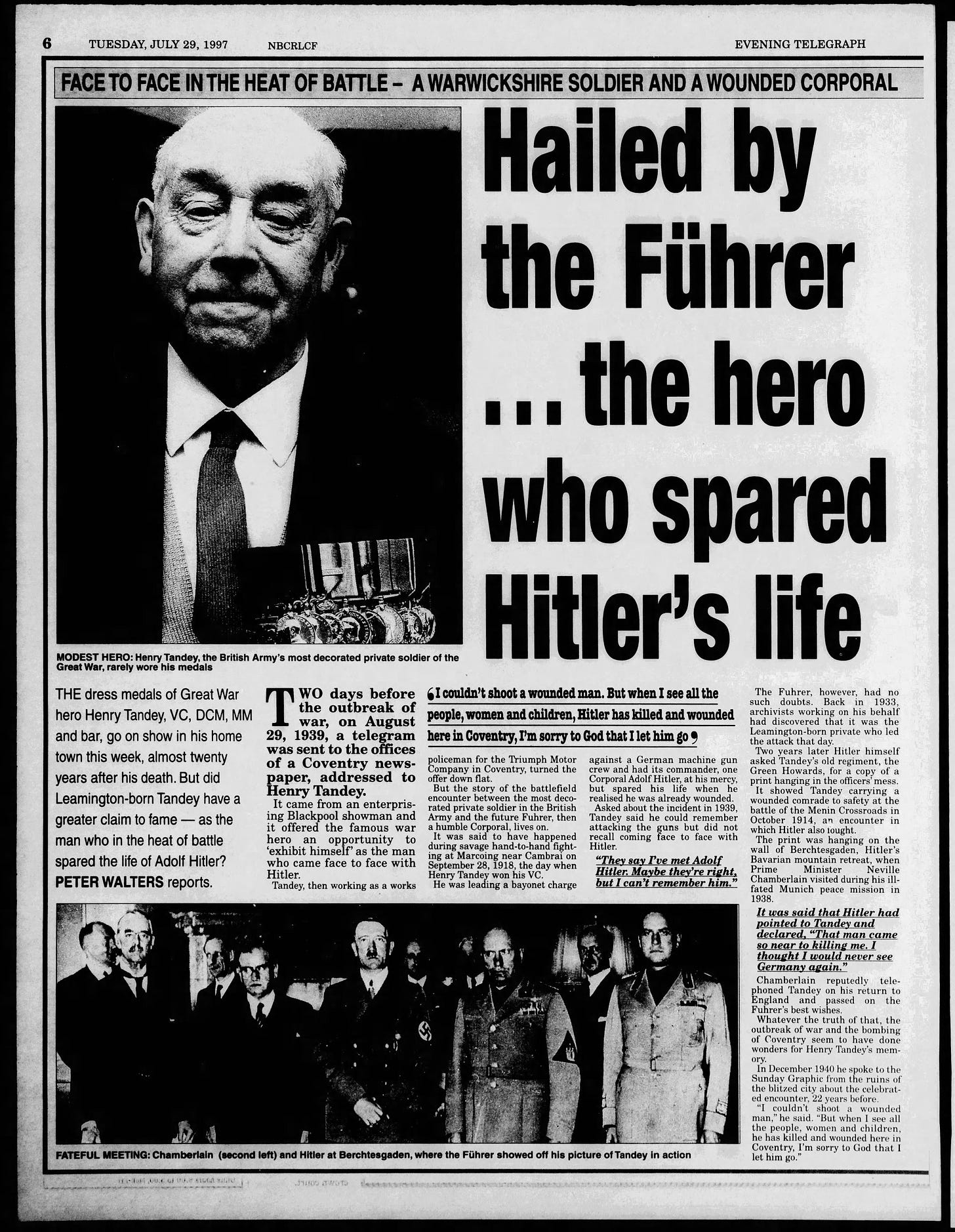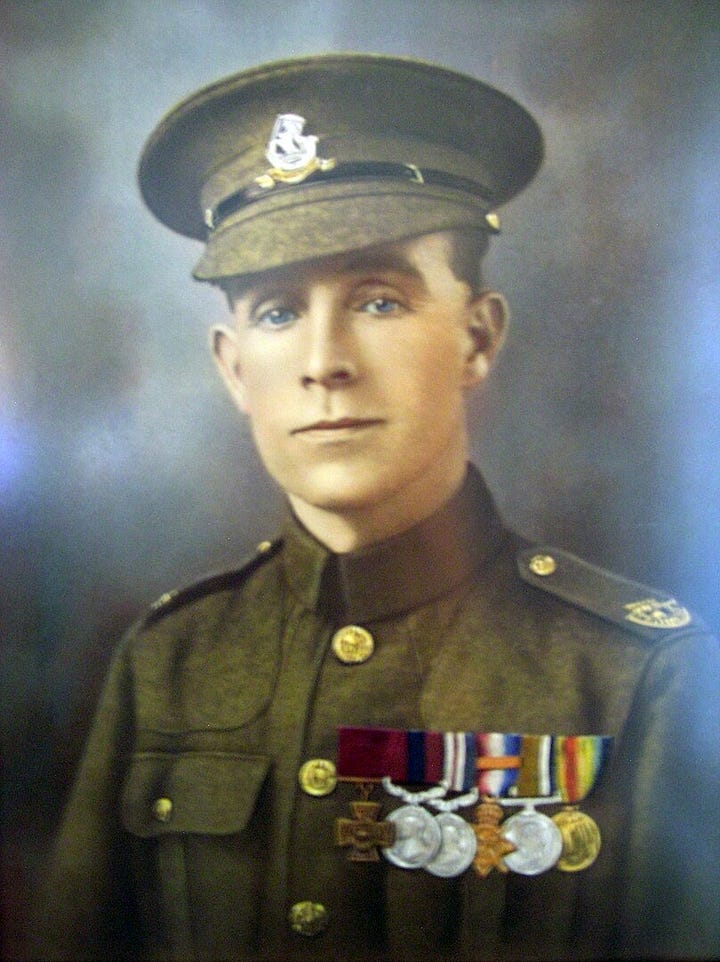People love to speculate if the world would have been better if a particularly loathsome, murderous historical figure had never been born or died before their infliction of terror. It can be an intellectual exercise or a form of therapy to make right what had been so wrong. So, let’s explore one of these suppositions. This is the story of Private Henry James Tandey who was the United Kingdom’s second most highly decorated private of the First World War. He also is the man who claimed to have spared the life of Adolf Hitler.
During World War I, the 27-year-old Tandey was a recipient of the highest award for gallantry in the British Commonwealth, the Victoria Cross. He was also awarded the Distinguished Conduct Medal. Private Tandey participated in the Battle of Ypres, was wounded during the Battle of the Somme, and wounded again at Passchendaele.

Tandey Spares Adolf Hitler
On September 28, 1918, a mere 6 weeks before the Armistice, Private Tandey was in the French Village of Marcoing, serving in the 5th Duke of Wellington’s Regiment. On that day, Tandey had been fighting in the 5th Battle of Ypres, for which he was awarded the VC. As the fight was coming to an end Tandey says a wounded German soldier came into his line of fire and he decided not to fire at him. He goes on to say that the German soldier acknowledged the lowered rifle, nodded thanks to Tandey and went on his way. It’s been said that Tandey regularly spared wounded and disarmed enemy soldiers, but on this day the spared soldier was 29-year-old Lance Corporal Adolf Hitler. “I took aim, but couldn’t shoot a wounded man,” Tandey said, “so I let him go.”
It is highly unlikely that Private Tandey spared Hitler’s life or that they were even in the same place together. Hitler looks to have been on leave in Germany from 10-28 September 1918. Also, Tandy himself was somewhat non-committal in his allegations. And really, who could remember the specific face of a dirty, wounded enemy soldier right after a battle in which his own heroic actions would earn him the highest military award in Britain?
In addition to his heroics and medals, Tandey also gained fame when he was depicted in a sketch that was later made into a painting by Italian artist Fortunino Matania. In the painting, Tandy is carrying a wounded comrade at the Kruiseke Crossroads in 1914. The sketch inspired Tandey’s Green Howards Regiment to commission the painting from Matania.


And Then There’s Hitler
The story takes an interesting turn when “evidence” that the story may be true comes to light. In 1938 British Prime Minister Neville Chamberlain went to Germany in his doomed effort to secure “peace for our time” from Hitler. Chamberlain was hosted by Hitler at his famous Eagle’s Nest compound in the Alps near Berchtesgaden. On a wall in the Eagle’s Nest Chamberlain noticed a copy of Matania’s painting depicting Tandey. Hitler points to Tandey in the painting and says, “That man came so near to killing me that I thought I should never see Germany again.”
So, is this evidence that Hitler also remembered Tandey? Henry Tandey’s biographer, Dr. David Johnson says, “Hitler was intent on impressing upon the German people that he had been saved for a greater purpose, namely restoring Germany to what he saw as its true position in the world.” Johnson goes on to say that the story was so much more exciting because of Tandey’s fame as a war hero. Not only was Hitler saved, but he was saved by this noble, heroic, medaled soldier.
But again, Hitler’s story, like Tandey’s, is problematic. Look at the painting by Matania. Tandey is the soldier in the foreground carrying a wounded comrade. Looking at Tandey in the painting his face has no dirt, no blood. But if in 1918 both Tandey and Hitler had just finished fighting in the brutal battle at Ypres, they would both be covered in dirt and the detritus of battle. So again, the story is shaky. But the veracity of the claim that Hitler had a copy of Matania’s painting is confirmed by the Green Howards Museum saying that the picture was important to Hitler. Hitler was always attracted to stories of heroism so of course he would love the tale of one of the most decorated soldiers in Britain that had the good sense to let him live.
In an article on BBC News online, Bethan Bell wrote that Private Tandy was “non-committal” about the story. He claims that Tandey did spare soldiers on the 28th of September and thought it may have happened but needed additional proof. At its core Tandey’s story is just that, a story. But his allegations and Hitler’s embrace of them add an interesting footnote in WWII history.
I work in Holocaust education, teaching students about the most despicable, criminal, and cruel event in world history authored by Adolf Hitler. I speak with the survivors and listen to their stories and their own work towards “never again” and I find myself not only wondering “what if?” but “if only.”






Is it clear who told the story first? I could imagine that Hitler would've told Chamberlain first (making it up for all the reasons you've described). And when the story inevitably made its way back to England, Tandy leaned into it, like your favorite old relative you know is just there for the story. What seems more insane is Tandy spending the '30s in England going out of his way to tell people: "That Hitler chap? Yeah I met him once, reckon I could've killed him when I'd had the chance!" Either way, thank you for sharing this!